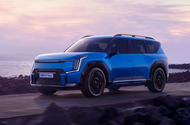New EV9 is Kia’s largest and most expensive global model
Kia’s new electric flagship is its most expensive car to date – and a hotter GT version is on the way
The upcoming Kia EV9 electric SUV will be the brand’s most expensive car yet when it arrives in the UK later this year priced from £64,995.
It is the second model in Kia’s bespoke EV line-up and will be followed by a range of cars, including the recently unveiled new Kia EV5. At its first European ‘brand summit’, Kia confirmed it will launch 15 EVs globally by 2027 – including a city car and crossover – and plans for a 28.5% growth in EV sales in Europe in the next seven years.
Kia has highlighted four key product attributes that it will focus on with upcoming models in order to “lead the future mobility market and develop sustainabile products”. As well as performance, these include design, connectivity services and autonomous technology. The EV9 is the first Kia that can receive over-the-air software updates, has advanced driver assistance systems and features a claimed 34kg of eco-friendly materials.
Measuring 5010mm long and with a wheelbase of 3100mm (longer than the US-market Kia Telluride), the firm’s new flagship will come as standard in the UK with a 99.8kWh, 800V battery, netting a range of up to 336 miles between charges. It is capable of gaining 148 miles of range in just 15 minutes.
The large SUV will launch later this year with a choice of two powertrains: rear-wheel drive with 200bhp and 258lb ft that takes it from 0-62mph in 9.4sec; and a dual-motor version offering 378bhp and 442lb ft, along with a 6.0sec 0-62mph time. A downloadable Boost function, available to install after purchase, will increase torque to 516lb ft and cut the sprint time by 0.7sec. An entry-level car with a 76.1kWh battery will be offered in other markets.
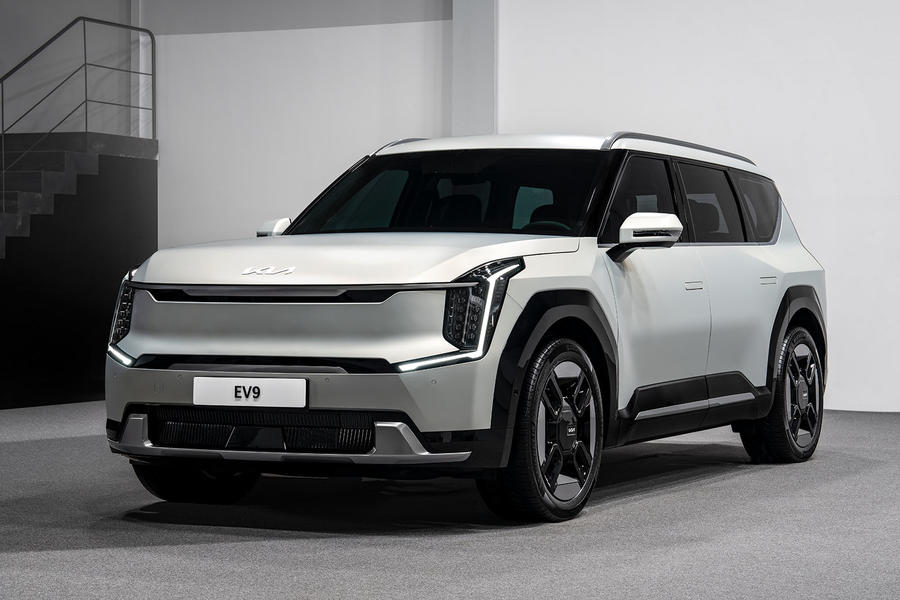
A hotter EV9 GT is also “just around the corner”, with the firm claiming it will highlight that performance is set to be a key focus of its future line-up. The model is expected to surpass the Kia EV6 GT in power output and will receive a wide range of chassis changes.
The EV9 will also be available after launch in certain markets with a new ‘highway driving pilot’ system that uses 15 sensors (including two lidar devices) to offer level-three autonomous driving “where conditions permit”.
Arriving to join the segment-bending Kia EV6 crossover in dealerships from late 2023, the EV9 heralds the beginning of a bold new design era for Kia as it progresses with its ambitious ‘Plan S’ to launch another 13 bespoke EVs by 2027.
Its role is especially important in this regard, according to Kia’s chief brand officer Artur Martens, who said the EV9 “will help us keep reshaping the image consumers have of our brand” – an initiative supported by wide-reaching dealer reform measures and expansion into new segments.
The three-row EV will be the most expensive Kia model yet, as well as one of its largest. Entry-level Air-trim cars – the rangiest in the line-up, completing 336 miles between charges – are priced from £64,995. The more sporting GT-Line and GT-Line S variants are priced from £72,495 and £75,995 respectively, with the range-topping six-seat GT-Line S hitting £78,745.
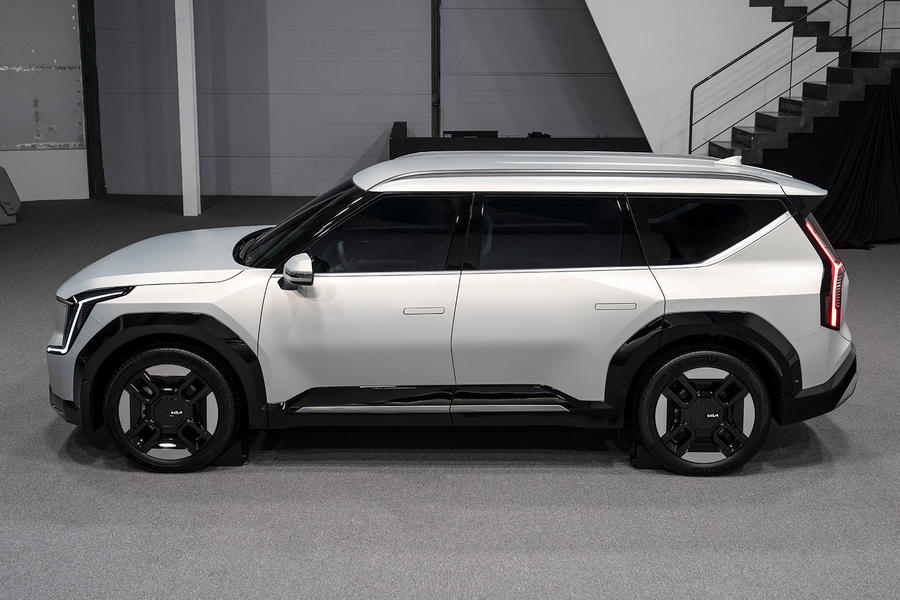
The EV9 is the first all-new Kia designed entirely under the stewardship of ex-BMW designer Karim Habib, who explained that all future models will contain obvious visual links, without the brand pursuing a ‘Russian doll’ approach to its line-up.
With regard to its silhouette and definitive design cues, the production-spec EV9 remains heavily faithful to the radical concept Kia showed at Los Angeles in 2021, but it rides noticeably closer to the ground – courtesy of a much thicker battery pack and 21in wheels in place of the concept’s 23s (19in and 20in items will be available) – and has softened some of the show car’s sharpest edges. Kia calls its design approach for this new EV family ‘Opposites united’ and says the EV9 embodies it with a “unique blend of sleek, sculptural design with confident and assertive geometry”.
But ultimately, the EV9 is much more recognisably a dedicated SUV than the rakish, low-slung EV6. “This is an SUV and we wanted that typology to be very clear,” said Habib, pointing to its chunky black body cladding (available in gloss or matt) and clearly defined, two-box silhouette, while highlighting some of the more non-conventional cues that nod to the EV9’s electric underpinnings.
“It’s very upright, and it very much has what we think is an authentic SUV typology,” he said. When asked by Autocar why the designers hadn’t been tempted to pursue a more unconventional silhouette, he said: “There’s something really nice about these sort of authentic, honest, boxy SUVs. When you look at a Land Rover Defender today – old or new – you know that there’s still something really quite cool about that.”
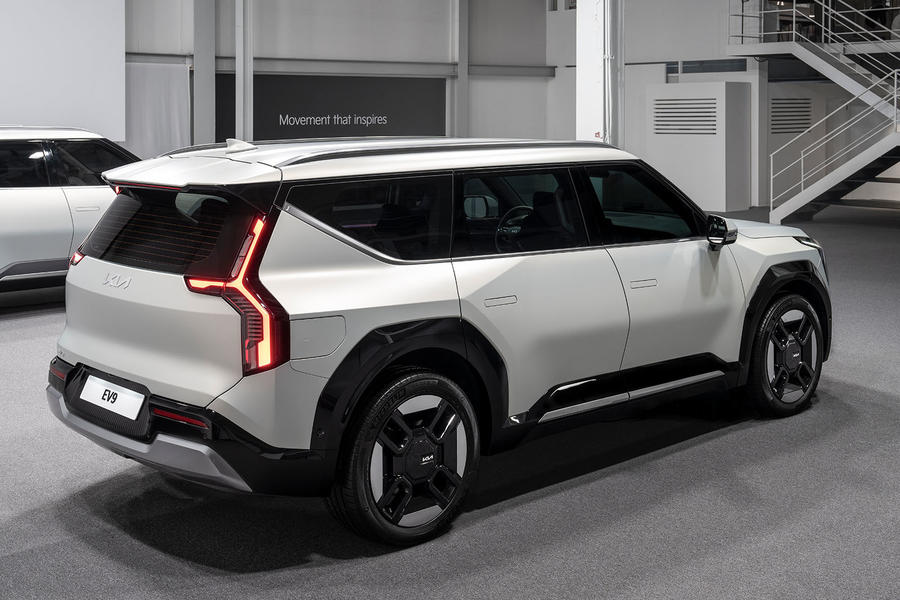
He also suggested that he’d been inspired by the fact that traditional rugged 4x4s simply used bent, rather than stamped, body panels, which influenced the EV9’s minimalist and straight-edged details.
Some of the car’s defining cues that will go on to influence future models include the distinctive trapezoidal creases on its rear quarters, its visibly stretched glasshouse (possible due to the lack of an engine), kinked rear window line, selection of striking new wheel designs and – most obviously – its ‘star map’ LED light signatures at the front and rear.
The latest version of Kia’s ‘Tiger face’ grille also makes its debut here although, without any need for engine cooling, it now takes the form of an expansive smooth panel that can be decorated with customisable LED light patterns shining through from behind – as was the case with the concept.
The headlights and brake lights play an important design role too, being oriented vertically and mounted right on the corners of the body to make the EV9 appear as wide as possible.
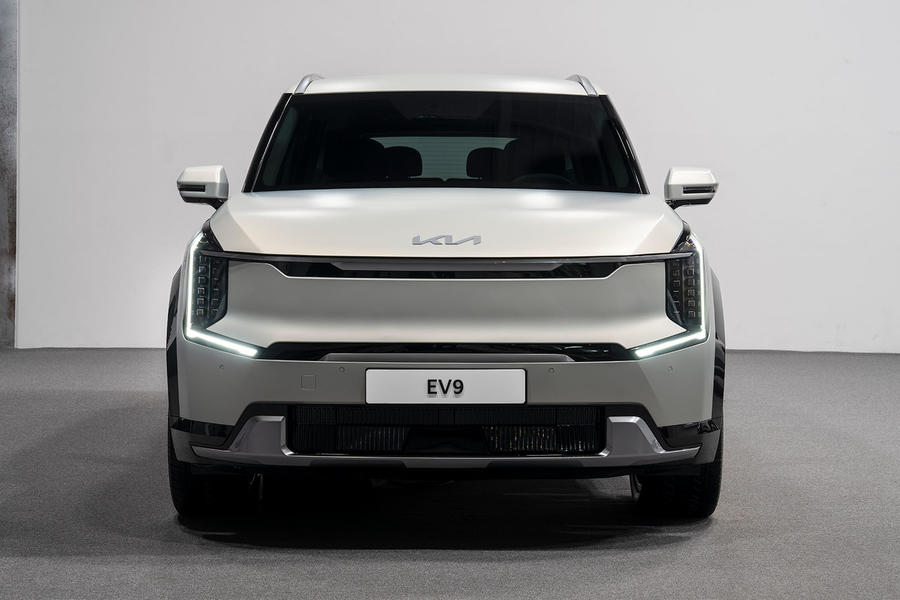
Habib gave some hints as to how Kia will look to imbue future mass-market models with similarly distinct characters while retaining popular appeal. He said: “We want to be risk takers and this is mainly the challenge that we have, obviously, designing things that have to sell millions of millions of units.
“We want our products to feel, even for us within the process, to feel initially a little bit unknown, a little bit uncomfortable. And as we get through it, we believe that we feel more and more comfortable, and more and more enriched or inspired by those products, and we want that journey to be what our customers feel as well.”
Kia is equally keen to highlight the EV9’s pioneering interior, which breaks new ground for the marque by introducing a wealth of top-rung tech, an array of sustainable upmarket materials and unique packaging solutions in recognition of the fact that the car is becoming “more than just a vehicle to move people from A to B”, according to Kia.
The new-look dashboard is topped an expansive digital panel housing a trio of screens for use by the driver and passenger (complete with the most comprehensive array of connectivity-enabled functions yet) – and flanked by a pair of digital rear-view mirror displays, which will be available as an option in the UK.
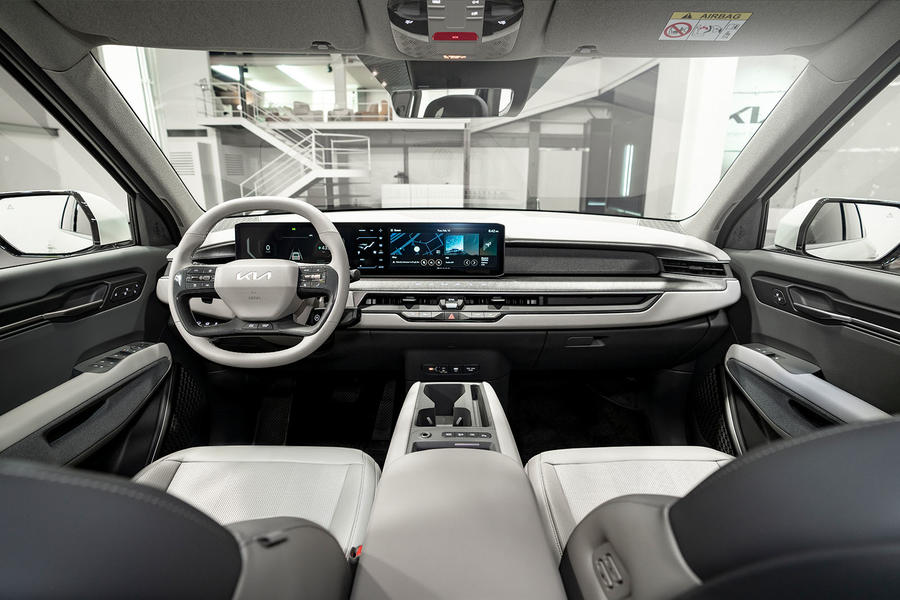
Interior design boss Jochen Paesen said that although Kia does not “want the screens and the digital content to dominate, it’s an integral part of what our cars have today, especially with over-the-air updates, especially with features on demand. This will grow and the amount of possibilities will grow. But we feel that needs to be balanced, the screen should not take over. The screen should not suddenly become the main part of the vehicle.”
Meanwhile, the flat floor of an EV enables not just more space at a top level, but also new approaches to packaging and enhanced modularity. The EV9’s swivelling middle row (only available on six-seat cars) allows the four rear passengers to face each other on the move – a unique feature in this segment and one that lends the EV9 heightened appeal outside the traditional family car market.
Bolstering its executive credentials include tray tables on the backs of the front seats, a digital climate control panel for the rear passengers and a dedicated ‘Automode’, which enables the highest level of assisted driving available on any Kia so far.
Details on what will follow the EV9 remain under wraps, but of the 13 bespoke Kia EVs arriving in the next three years, eight will come to the UK and are expected to broadly serve as electric alternatives or successors to the combustion models Kia currently sells.
Read more: Kia design boss: “The post-SUV is coming”
Source: Autocar
